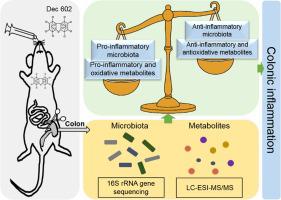Environment International ( IF 10.3 ) Pub Date : 2022-07-06 , DOI: 10.1016/j.envint.2022.107394 Yunping Li 1 , Heidi Qunhui Xie 2 , Yin Liu 3 , Li Xu 2 , Liping Zheng 2 , Shuyuan Yu 4 , Guomin Chen 4 , Jiajia Ji 4 , Shuai Jiang 4 , Tai L Guo 5 , Bin Zhao 1

|
Background
Chlorinated flame retardant Dechlorane 602 (Dec 602) has been detected in daily food, indicating that it may pose a risk to intestinal health. The intestinal microenvironment plays an important role in intestinal health. Intestinal microbiota and metabolites are two important factors for maintaining the microenvironment. However, little is known about the effects of Dec 602 on intestinal microbiota and metabolites.
Objectives
We aimed to probe the effects of Dec 602 on the intestine by revealing the changes that Dec 602 caused to the intestinal microbiota and metabolites.
Methods
Adult female C57BL/6 mice were exposed to Dec 602 (low/high doses: 1.0/10.0 μg/kg body weight per day) orally for 7 consecutive days, and sacrificed after 7 days of recovery. The composition of colonic microbiota was measured by 16S rRNA gene sequencing, and the colonic metabolites were determined by LC-ESI-MS/MS. Finally, the effects of Dec 602 on the colon were validated by histopathological analysis.
Results
The intestinal microbiota composition was altered toward a pro-inflammatory status after exposure to Dec 602. Dec 602 exposure also up-regulated oxidative metabolites (glutathione disulfide, taurine and retinoic acid) and pro-inflammatory metabolites (prostaglandin E2). On the other hand, antioxidative metabolites (s-adenosylmethionine and 11-cis-retinol) and anti-inflammatory metabolites (alpha-linolenic acid, eicosapentaenoic acid and docosahexaenoic acid) were down-regulated after exposure to Dec 602. Infiltration of lymphocytes in the colonic lamina propria was observed in the mice treated with Dec 602 for 7 days, and it was not recovered after another 7 days without further treatment.
Conclusion
Dec 602 interfered with the colonic microbiota and metabolome, and exhibited inflammatory features. Histopathological studies confirmed that Dec 602 exposure did induce colonic inflammation.
中文翻译:

氯化阻燃剂德氯烷602对小鼠肠道微环境的亚急性影响
背景
日常食品中检测到氯化阻燃剂DeChlorane 602(Dec 602),表明它可能对肠道健康构成风险。肠道微环境对肠道健康起着重要作用。肠道微生物群和代谢物是维持微环境的两个重要因素。然而,人们对 Dec 602 对肠道微生物群和代谢物的影响知之甚少。
目标
我们的目的是通过揭示 Dec 602 对肠道微生物群和代谢物造成的变化来探讨 Dec 602 对肠道的影响。
方法
成年雌性C57BL/6小鼠连续7天口服暴露于Dec 602(低/高剂量:每天1.0/10.0μg/kg体重),并在恢复7天后处死。通过16S rRNA基因测序测量结肠微生物群的组成,并通过LC-ESI-MS/MS测定结肠代谢物。最后,通过组织病理学分析验证了 602 年 12 月对结肠的影响。
结果
暴露于Dec 602后,肠道微生物群组成向促炎状态改变。Dec 602暴露还上调氧化代谢物(谷胱甘肽二硫化物、牛磺酸和视黄酸)和促炎代谢物(前列腺素E 2 )。另一方面,暴露于Dec 602后,抗氧化代谢物(s-腺苷甲硫氨酸和11-顺式视黄醇)和抗炎代谢物(α-亚麻酸、二十碳五烯酸和二十二碳六烯酸)下调。用Dec 602治疗7天的小鼠中观察到结肠固有层,并且在不进一步治疗的情况下再7天后仍未恢复。
结论
Dec 602 干扰结肠微生物群和代谢组,并表现出炎症特征。组织病理学研究证实 602 年 12 月的暴露确实诱发了结肠炎症。






























 京公网安备 11010802027423号
京公网安备 11010802027423号